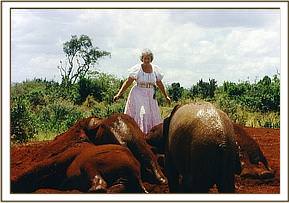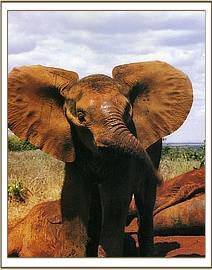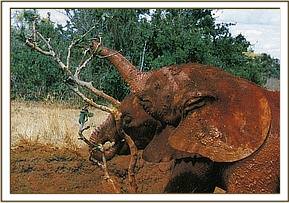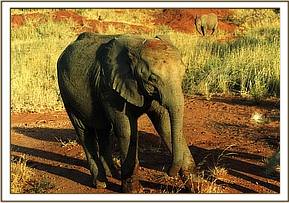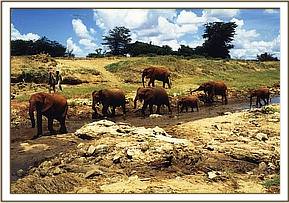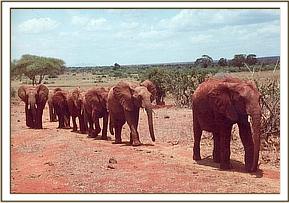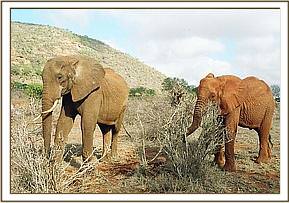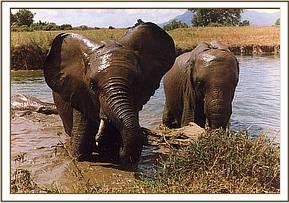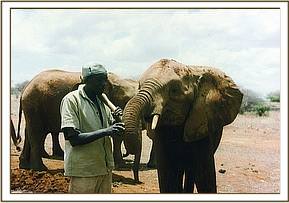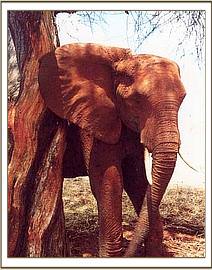




Now living wild, although she continues to visit from time to time
Current age
36 years old
Gender
Male
Rescued date
15 September 1989
Rescue location
Amboseli Ecosystem, Amboseli National Park
Date of birth (estimate)
1 March 1989
Reason orphaned
Human-Wildlife Conflict
Age at rescue
6 months old (approx)
Current location
Living Wild
Another important factor that makes the Amboseli population of elephants unique is that it is the only elephant population on the entire African Continent that has not been fragmented by poaching for the Ivory Trade. In Amboseli, magnificent high ranking bulls over 50 years in age, carrying huge tusks still exist, as do elderly Matriarchs who are grandmothers and even great grandmothers with intact family units to illustrate natural behaviour patterns not seen elsewhere. Our orphan Edo is the son of an Amboseli cow called 'Emily', the elder sister to the now famous 'Echo', the star of many books and films.
'Emily' was the Matriarch of the unit known for Scientific purposes as 'The E Group', but sadly she died as a result of foraging in the rubbish pit of a nearby Safari Lodge, and in amongst the peelings of fruit and vegetables, which were the draw in the first place, were bottle-tops, broken glass, torch cells and even an ash-tray, all of which she ingested, and were revealed in amongst the stomach contents during a post-mortem examination to determine the cause of death. Edo, her calf, was 6 months at the time, having been born in March 1989.
It so happened that a Japanese Film Unit were filming the E Group of elephants for a documentary at the time, perhaps having chosen this particular unit because of the name Edo, the name of an ancient Japanese capital city. Elephant Edo was a particularly playful baby, and the main subject of their film, so they were dismayed and perplexed to suddenly find him minus a mother, but still with the E group, though visibly not himself, being despondent and clearly unhappy. Although his mother Emily used to allow Echo's baby access to her milk, Echo would not allow Edo to suckle her, and since at 6 months he was still fully milk dependent. As the days past, he became ever more weak, lagging behind the family and spending a lot of time lying down to rest. Since Amboseli Park is well watered with numerous swamps, fortunately he had access to water, and he tried to ease the pangs of hunger by swallowing what vegetation he could, but he was far too young to be able to digest it. Clearly, he was doomed to die gradually of milk deprivation, and had it not been for the presence of the Japanese Film Unit, he would probably have become another number amongst other scientifically recorded deaths and a statistic of the Scientific Study. Fortunately, however, the Japanese Film Unit needed a better ending to their story, so we were alerted to attempt a rescue, the first ever undertaken of an Amboseli orphan. Present in our Nairobi Nursery at the time were 5 other infant elephant orphans, namely Olmeg, Taru, Dika, Ndume and Malaika.
Another important factor that makes the Amboseli population of elephants unique is that it is the only elephant population on the entire African Continent that has not been fragmented by poaching for the Ivory Trade. In Amboseli, magnificent high ranking bulls over 50 years in age, carrying huge tusks still exist, as do elderly Matriarchs who are grandmothers and even great grandmothers with intact family units to illustrate natural behaviour patterns not seen elsewhere. Our orphan Edo is the son of an Amboseli cow called 'Emily', the elder sister to the now famous 'Echo', the star of many books and films.

View diary updates from across all our orphan units as written by the Keepers

Imagine our joy upon discovering that the ‘wild’ bull who had been habitually drinking fresh shower water at Mark Deeble and Vicky Stone’s camp on the lower reaches of the seasonal Voi River turned out to be none other than ‘Ndume’ our 26 years old ex orphan
By adopting, you play a vital role in the life of an orphaned elephant, rhino, or giraffe — helping us provide the round-the-clock, loving attention each one needs and deserves over many years, so they can ultimately reclaim their place in the wild.
Your adoption supports the 100+ orphans in our care at any given time, covering the cost of milk and food supplies, Keepers' salaries, veterinary treatment, and other essentials.

Celebrate your adoption with a personalised certificate, ready for you or your lucky gift recipient to print and display!

Each month, we send a detailed update about our Orphans’ Project direct to your email inbox, featuring photos, stories, and special highlights.

From the latest Keepers’ Diaries to a downloadable image gallery and more, adopters have exclusive access to our content library.
